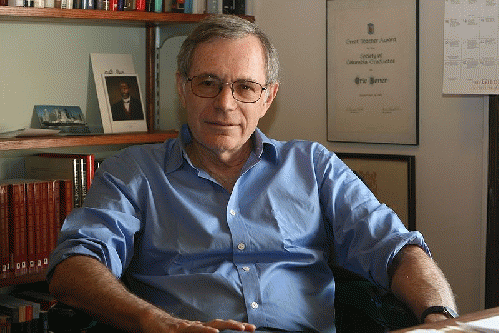Is the United States an empire? Only in the US could such a question even be asked. To the rest of the world, the answer is obvious: the US is perhaps the most powerful empire the world has known. Empire means dominion, the desire and ability to determine the fate of peoples near and far. And in every index of power "hard' and "soft', military, economic and cultural the US far exceeds all other nations. It accounts for one-third of the world's gross domestic product and military spending. Even before the Iraq war, it had more than 700 military installations overseas. It is not surprising that in such circumstances, many Americans feel that the country can impose its will on the rest of the world, establishing rules of conduct for others while acting as it sees fit.
In recent times, it has mainly been critics of the country's foreign policy who have spoken of an American empire. Empire has seemed distasteful, a relic of a less enlightened era of international relations. America, George W. Bush insisted during the 2000 election campaign, had "never been an empire' and had no intention of becoming one. Politicians still shy away from the term. But since the attacks of 11 September 2001, the term "empire' has been used without embarrassment by political commentators in the US. The need to shoulder the burdens of empire is now a common theme in discussions among the foreign policy elite. Conservative writers such as Charles Krauthammer forthrightly defend American empire as an exercise of raw power, while traditional liberals like Michael Ignatieff promote it as a way of protecting human rights against tyrannical regimes.
Perhaps the leading current populariser of the idea is Niall Ferguson. Only an American empire, he insists, can secure order in a dangerous, unruly world. He does not deny that the US is and always has been an empire. The only question for him is whether it possesses the means to continue to act as one. His recent book, Colossus, is a how-to manual for Americans ambivalent about the financial and psychological costs of empire. [*]
The idea that the US is and should be an empire has a long history, one linked to the belief that by example, force or a combination of the two, the country should try to remake the world in its own image. Our empire, however, was to be different from all others. Jefferson spoke of America as an "empire of liberty'. When the nation stepped onto the world stage as an imperial power in the Spanish-American War of 1898, President William McKinley insisted that ours was a "benevolent' imperialism, that the conquest of Puerto Rico and the Philippines ought not to be compared to the despotic actions of European powers. Woodrow Wilson insisted that only the US possessed the combination of military power and moral righteousness to make the world safe for democracy.
Like Ferguson, Fred Anderson and Andrew Cayton begin with the premise that the US has always been an empire. But in contrast to Ferguson's brief, sanitised account of US history, which leaves the impression that the country's territorial expansion on the North American continent took place largely through peaceful settlement and the purchase of land, Anderson and Cayton emphasize the centrality of military conquest.
They are nothing if not ambitious. Their aim in The Dominion of War is to dismantle what they call the traditional "grand narrative' that portrays American history as the emergence and triumph of freedom in one nation, its spread across the continent, and its mission to liberate the oppressed peoples of the world. Long since abandoned, or at least severely modified, by professional historians, this vision remains alive and well in the popular imagination, in our public monuments and in political rhetoric. "Ours,' President Bush declared in 2002, "is a history of freedom; freedom for everyone.'
Anderson and Cayton insist that American history is a bit more complicated than that. War, they write, has been the major "engine of change' that "defined' American history and created the American empire. They reject the popular idea that Americans go to war only as a last resort, motivated by self-defence or the desire to preserve and spread freedom rather than national aggrandisement. "Good wars', like the Revolution and World War Two, which seem to fit this model, are memorialised in Washington, Hollywood films and national bestsellers. Anderson and Cayton, by contrast, devote extended attention to wars for which no public monuments exist and of which most Americans remain ignorant. These include the war against Britain of 1812, motivated in large part by the hope of conquering Canada and seizing land occupied by Indians east of the Mississippi; the Mexican-American War of 1846-48, in which the United States forcibly annexed one-third of the territory of its southern neighbour; and the Philippine War of 1899-1902, in which American troops fought a brutal struggle against insurgents who viewed them as occupiers, not liberators.
The Dominion of War also challenges the venerable notion of American exceptionalism. Rather than a shining city on a hill (as the Puritan settlers believed) or the last best hope of earth (as Lincoln put it), Anderson and Cayton see the US as a nation no different from many others. It seeks to maximise its own power and to exercise dominion over as large an area as possible. There is nothing distinctively American, either, in the cynical deployment of moral arguments to justify empire. Sixteenth-century Spaniards claimed to be "freeing' Indians from backwardness and superstition. Late 19th-century Britons insisted that imperialism in Africa was inspired, in part, by a desire to suppress slavery. There is nothing new in slogans like "Operation Iraqi Freedom'.
To forge a "counter-narrative' of American history, Anderson and Cayton structure their book around a series of detailed vignettes, focused on nine individuals. Their selection includes some familiar names, such as George Washington and Andrew Jackson, and some surprising ones, including Samuel de Champlain, who did more than anyone to create the French empire in 17th-century North America, and Antonio LÃ �pez de Santa Anna, the Mexican leader who suffered defeat both in the Texas War for Independence and the Mexican-American War.
Given that Anderson and Cayton are well-regarded scholars of colonial and early national America, it is perhaps not surprising that the early chapters are the most persuasive. They offer striking illustrations of how relations with Native Americans powerfully shaped the origins of the American empire, and how that empire eventually expelled or destroyed the continent's original inhabitants. Believing that empire could be based on "intercultural co-operation' rather than brute force, Champlain dealt with Indians on humane and relatively equal terms, in contrast to English settlers, whose policies smacked more of apartheid than engagement. Yet by introducing European weapons and forging military alliances with certain Indians, Champlain set in motion events that led to persistent warfare and the destruction of entire tribes.
No matter how benevolently conceived, empire is inherently violent and destructive. This lesson comes through in the story of William Penn, who founded the colony of Pennsylvania as a haven for persecuted English Quakers (and land-hungry Europeans generally). Penn promised settlers land at low prices, and tried to deal fairly with local Indians. But his policies were self-contradictory. The success of his colony, not to mention his fortune, depended on selling as much land as possible. Pennsylvania's population doubled every 18 years. Burgeoning white settlement inevitably meant conflict with the Indians. By the mid-18th century, relations between Penn's successors and Indians had become more violent and antagonistic than in any other English colony.
The same themes of territorial expansion and Indian subjugation inform the chapters on George Washington, which illustrate the continuities and differences between the British Empire and the American one created in 1776. Like the rest of the Virginia gentry, Washington engaged actively in land speculation and did not recognise any limit on westward expansion. (This is why the Proclamation of 1763, by which authorities in London sought to curb white settlement west of the Appalachians, alarmed Virginians as much as British taxes that tried to make them share the financial cost of empire.) When independence came, it produced an "imperial republic' far more dangerous to the Indians than the British had been, since its proclaimed devotion to liberty through continuous territorial expansion required the "conquest and ethnic cleansing' of the native population. Anderson and Cayton point out that the battles of the Revolutionary War celebrated in history books Saratoga, Trenton, Yorktown were accompanied by a forgotten "total war' on the frontier that led to the devastation of entire Indian villages. Washington himself ordered that Indian communities in upstate New York "be not merely overrun but destroyed'.
American independence produced a decentralised, agrarian empire, in which liberty rested on opening up more and more land in the West while reducing the presence of the national government in Americans' lives. This was Jefferson's "empire of liberty'. Anderson and Cayton ignore a rival conception of empire, associated with Alexander Hamilton, that also arose in the aftermath of independence. Hamilton believed that national greatness required the construction of a robust central state modelled on Great Britain, with a standing army, a powerful navy and a government tied closely to the economic self-interest of the wealthiest Americans. Hamilton's vision was rejected at the time, but it has more in common with today's American empire than Jefferson's agrarian republic.
Nearly half of The Dominion of War covers the colonial and revolutionary eras. The two centuries from 1800 to the present are treated in a far more cursory manner. Andrew Jackson exemplifies the rise of a populist, racist imperialism in which liberty became an entitlement of white men. Ulysses S. Grant consolidates the power of the nation-state through his victory in the Civil War, and as president tries to reconcile "American power with American values' by adopting a "peace policy' towards the remaining Indians, but to no lasting effect. The career of Douglas MacArthur illuminates the expansion of American global power in the first half of the 20th century.
The two hundred pages allotted to the 19th and 20th centuries are too few to do justice to the themes of warfare and empire. Anderson and Cayton's account of the Spanish-American War of 1898 and its aftermath, however, bears an uncanny resemblance to today's headlines. American leaders hailed the acquisition of the Philippines from Spain as part of the narrative of global freedom. But when residents of the islands rose up against the occupying forces, the American commander, Douglas MacArthur's father, presided over a war that involved the torture of prisoners and horrendous civilian casualties.
(Note: You can view every article as one long page if you sign up as an Advocate Member, or higher).






